Maker Challenge 2022: A look back at a year of youth innovation
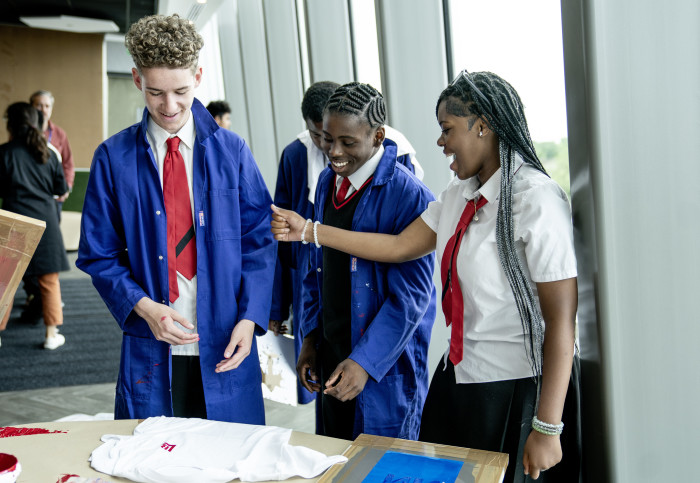
A year of innovation from this year’s Maker Challenge cohorts – an outreach programme for local young people to bring their ideas to life.
The Maker Challenge is one of Imperial College London’s innovative outreach programmes. The Maker Challenge empowers local young people to solve real-world problems through design and engineering.
"I have been so impressed by the creativity, enthusiasm and determination of our Maker Challenge participants." Melanie Bottrill Head of Outreach
Supported by Imperial experts and with access to world-class facilities, 2022 saw 94 young people aged 14-18 take part in the challenge across five cohorts: 21-25.
Melanie Bottrill, Head of Outreach Programmes, said “I have been so impressed by the creativity, enthusiasm and determination of our Maker Challenge participants. Its been wonderful to see how they have bought their ideas to life during their time on the programme – we love seeing how they use different skills and techniques to solve problems.”
As part of the programme, participants created prototypes of their inventions and presented their ideas to a panel of judges and family members. One parent said, “I can’t tell you as a working mum how wonderful it was to come home every night to see Charlie so happy having had such an enjoyable day, mentally stimulated and so happy having met so many lovely, interesting people and new friends, also very tired (in a good way!)"
The next Maker Challenge cohorts will take place in July and August with applications opening in the Spring.
Bringing music to the deaf community
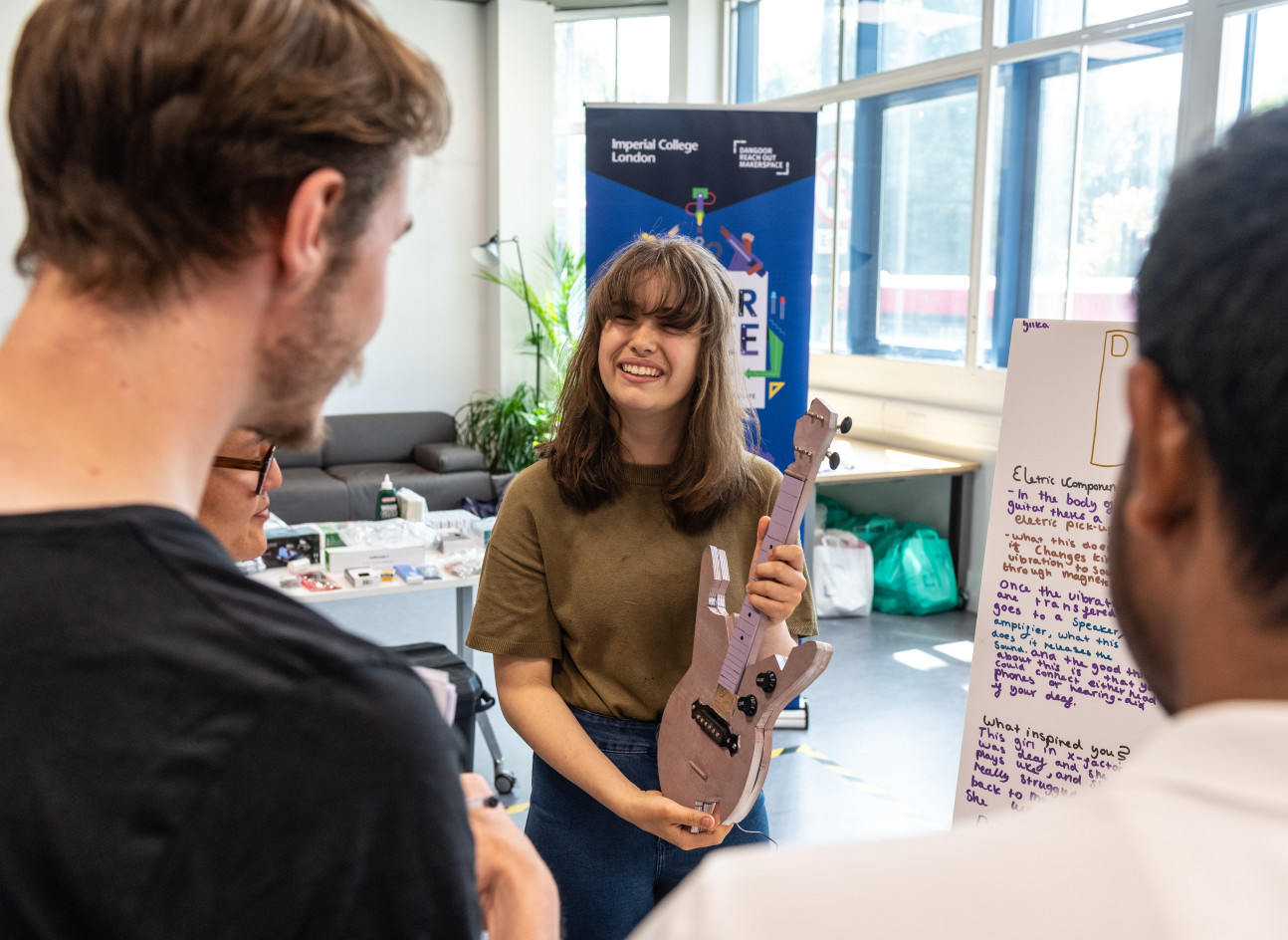 The winner of cohort 21, announced in July, was Yllka for her project Damian Codlin – an electric ukulele designed for people with impaired or no hearing. Inspired by a deaf musician on The X Factor, this ukulele contains an electric pick-up which changes kinetic vibration into sound through magnets. It’s designed to allow vibrations to transfer through a connected speaker amplifier into sound, which can be connected to headphones or a hearing aid, thereby enabling those with complete or partial deafness to enjoy music. The judges were impressed with Yllka’s cleverly designed prototype and original concept.
The winner of cohort 21, announced in July, was Yllka for her project Damian Codlin – an electric ukulele designed for people with impaired or no hearing. Inspired by a deaf musician on The X Factor, this ukulele contains an electric pick-up which changes kinetic vibration into sound through magnets. It’s designed to allow vibrations to transfer through a connected speaker amplifier into sound, which can be connected to headphones or a hearing aid, thereby enabling those with complete or partial deafness to enjoy music. The judges were impressed with Yllka’s cleverly designed prototype and original concept.
Write like the wind
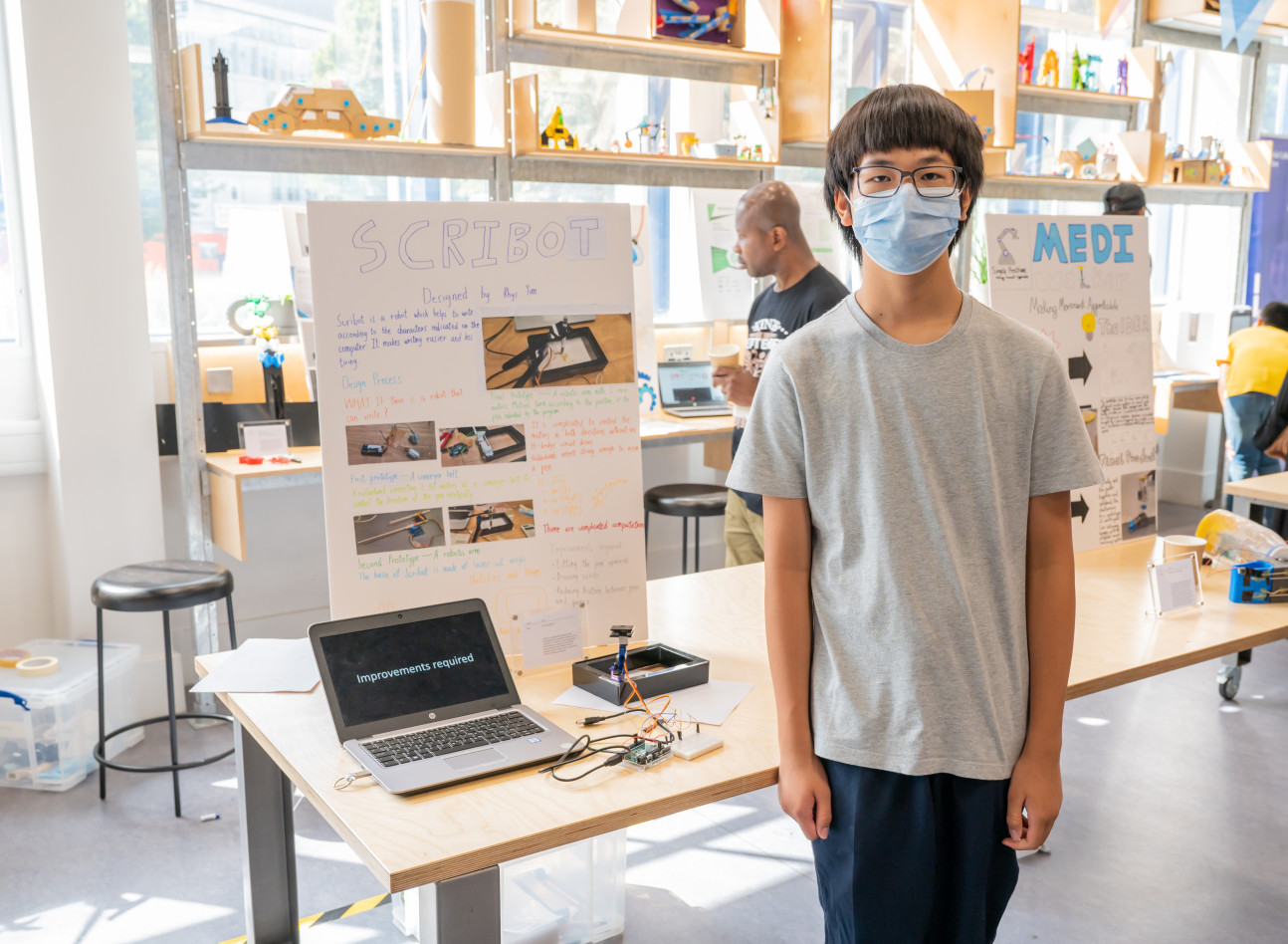 Cohorts 22 and 23 took place as intensive nine-day-long programmes over the summer and the projects were presented in one grand finale event in August. Local student Rhys won first place for his project, Scribot - a robot which converts typed text into writing on paper. With a laser cut acrylic base, Scribot has a robotic arm with two servo motors which turn according to the position of the pen indicated by the programme. It is made to make writing easier and less tiring. As typing is usually faster than writing, this also reduces the time needed to write. The judges commended Rhys for his multiple iterative working prototypes and clear design process.
Cohorts 22 and 23 took place as intensive nine-day-long programmes over the summer and the projects were presented in one grand finale event in August. Local student Rhys won first place for his project, Scribot - a robot which converts typed text into writing on paper. With a laser cut acrylic base, Scribot has a robotic arm with two servo motors which turn according to the position of the pen indicated by the programme. It is made to make writing easier and less tiring. As typing is usually faster than writing, this also reduces the time needed to write. The judges commended Rhys for his multiple iterative working prototypes and clear design process.
Other innovations
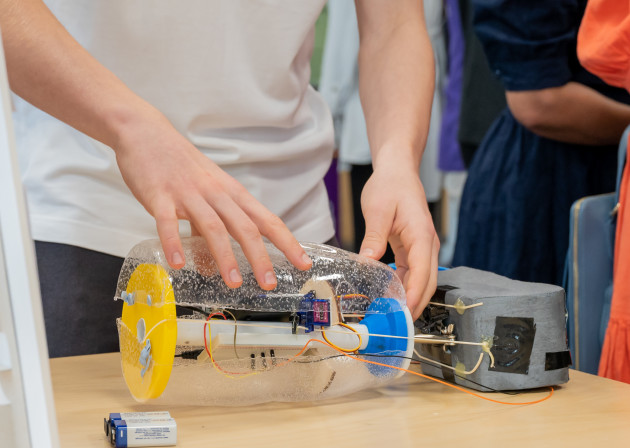 Other innovations included a prosthetic leg - Medi-Walker - that electrically simulates muscle tensioning. Year 9 student Stefan was inspired by a relative who has been an amputee since the age of 18 and who lives in the Ukranian countryside where good quality prosthetics are very hard to come by. The judges were impressed with Stefan’s advanced prototype and well-presented design solution to a common problem.
Other innovations included a prosthetic leg - Medi-Walker - that electrically simulates muscle tensioning. Year 9 student Stefan was inspired by a relative who has been an amputee since the age of 18 and who lives in the Ukranian countryside where good quality prosthetics are very hard to come by. The judges were impressed with Stefan’s advanced prototype and well-presented design solution to a common problem.
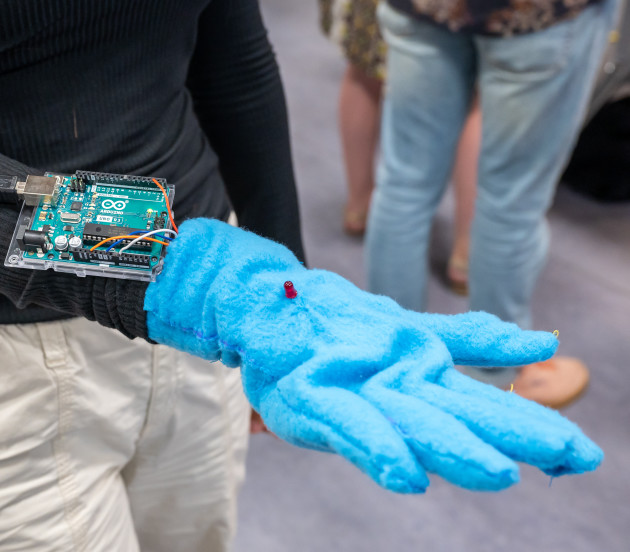 Year 11 student Viona created Luxglove - a glove that enables cyclists to signal at night using motion-activated LED lights, thereby reducing accidents from poor reaction times.
Year 11 student Viona created Luxglove - a glove that enables cyclists to signal at night using motion-activated LED lights, thereby reducing accidents from poor reaction times.
“I cycle a lot so it was inspiration from that and people around me. When you extend your arm it turns on and when you indicate with your hand it turns off. It uses a flex sensor as the safety feature,” said Viona. “It was rewarding seeing stuff work... I actually enjoyed it more than I thought. Everyone was welcoming and really helpful”
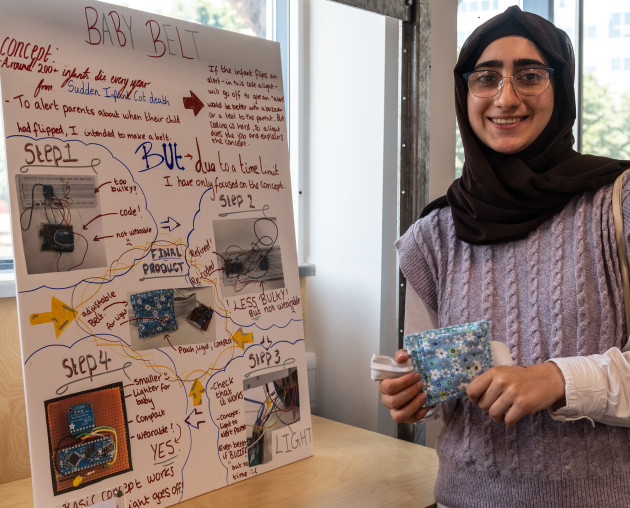 Winning second place for her cohort was student Derya for her creation called Baby Belt – a device aimed at preventing SIDS, otherwise known as cot death, by identifying and alerting the parent via a lightbulb. Around 200+ newborns die every year from cot death – Baby Belt is worn by the infant at night and if they turn over during sleep, it alerts the parents via a light or text message.
Winning second place for her cohort was student Derya for her creation called Baby Belt – a device aimed at preventing SIDS, otherwise known as cot death, by identifying and alerting the parent via a lightbulb. Around 200+ newborns die every year from cot death – Baby Belt is worn by the infant at night and if they turn over during sleep, it alerts the parents via a light or text message.
Life after the Maker Challenge
Some graduates have taken an alternative path, such as Aaron (winner of cohort 7 with his project Visor), who is now undertaking a Degree Apprenticeship in Electronic Engineering.
“It’s been 3 years since my time at the Makerspace and I’d love to let you know how the experience has impacted me. I am currently working at Airbus Space on a Degree Apprenticeship studying Electronic Engineering. I’m just about to enter my second year after achieving a first for my first year.
“During my Airbus interview I made sure to reference to my experience on the Maker Challenge as it definitely affirmed my decision to pursue an engineering/design career. I had originally intended to study Design Engineering at Loughborough, however when presented with the opportunity of 4 years of paid work experience?in addition to having my degree paid for I had to go for it.
“Continuing my passion for Outreach I’ve made sure to join Airbus’ Outreach team with the hope I’ll be able to spread my enjoyment of STEM with others. My Makerspace win along with the experience associated with it are all memories that will definitely remain with me for a long time. Thank you all.”
Schools Outreach
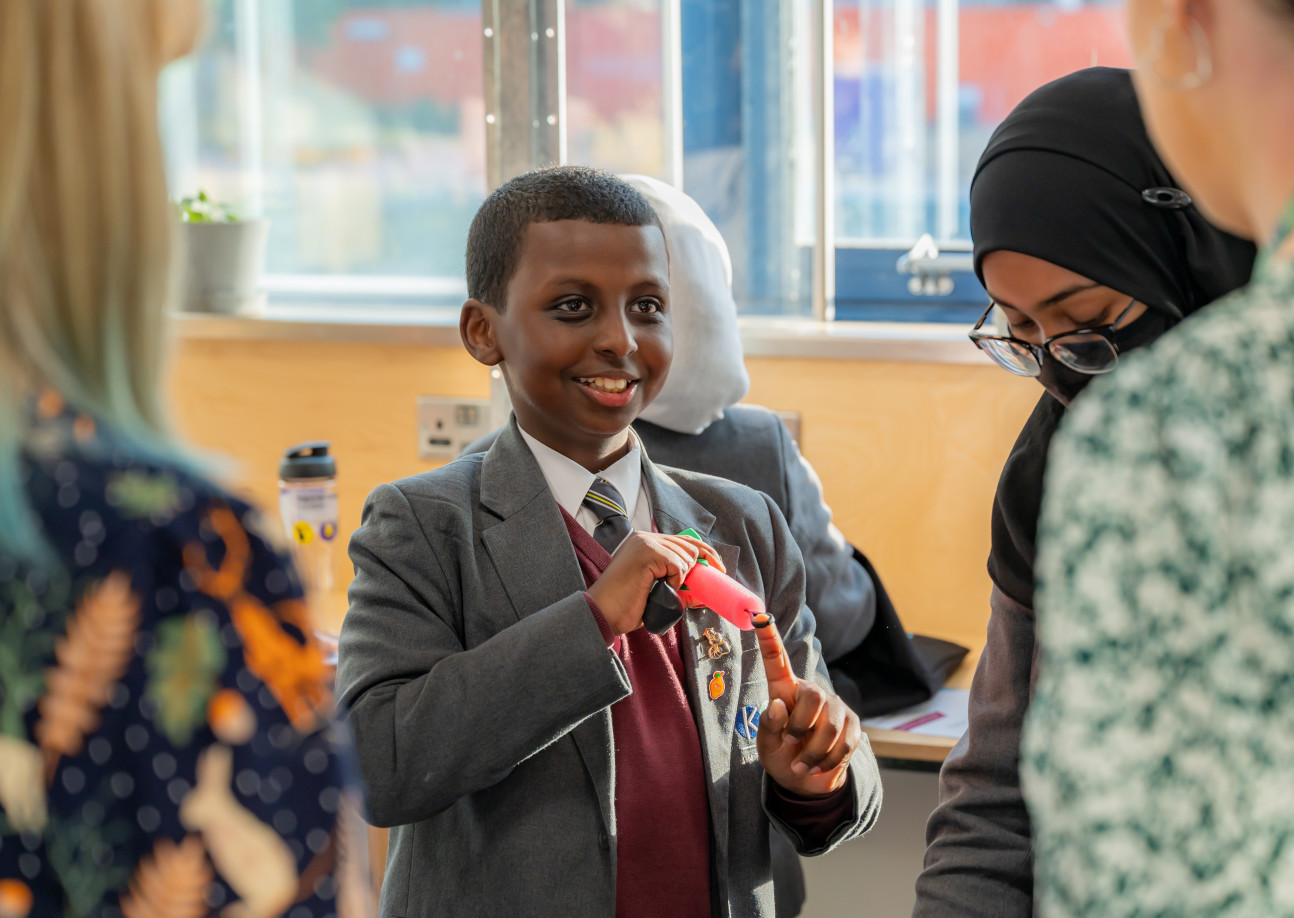 In addition to the Maker Challenge, the team behind the programme ran a Proto-Maker Challenge which saw seven schools challenged to invent, design and prototype a new musical instrument, utilising the mystery materials kit provided. Schools taking part this year included Westminster Academy, Fulham Cross Academy, Cardinal Vaughan Memorial School, Hammersmith Academy, Gunnersbury School, Alperton Community School and Kensington Aldridge Academy.
In addition to the Maker Challenge, the team behind the programme ran a Proto-Maker Challenge which saw seven schools challenged to invent, design and prototype a new musical instrument, utilising the mystery materials kit provided. Schools taking part this year included Westminster Academy, Fulham Cross Academy, Cardinal Vaughan Memorial School, Hammersmith Academy, Gunnersbury School, Alperton Community School and Kensington Aldridge Academy.
Over four taught workshops and one independent making session, pupils learned design thinking (fast sketching), prototyping (prototyping a working paper flute), coding music using Javascript on Mary Rose-Cook’s drum machine and building a theremin – a electronic musical instrument controlled without physical contact.
Cardinal Vaughan Memorial School were awarded 1st place for their invention, “Maestro – make music while you game!”. Maestro is a gaming controller where every button creates sound from a different instrument, which once connected to a phone allows the user to compose music with just one controller. Their prize is a 3D printer for the school and the chance to work with a professional designer at the Makerspace to bring their idea to life.
Local Community Engagement
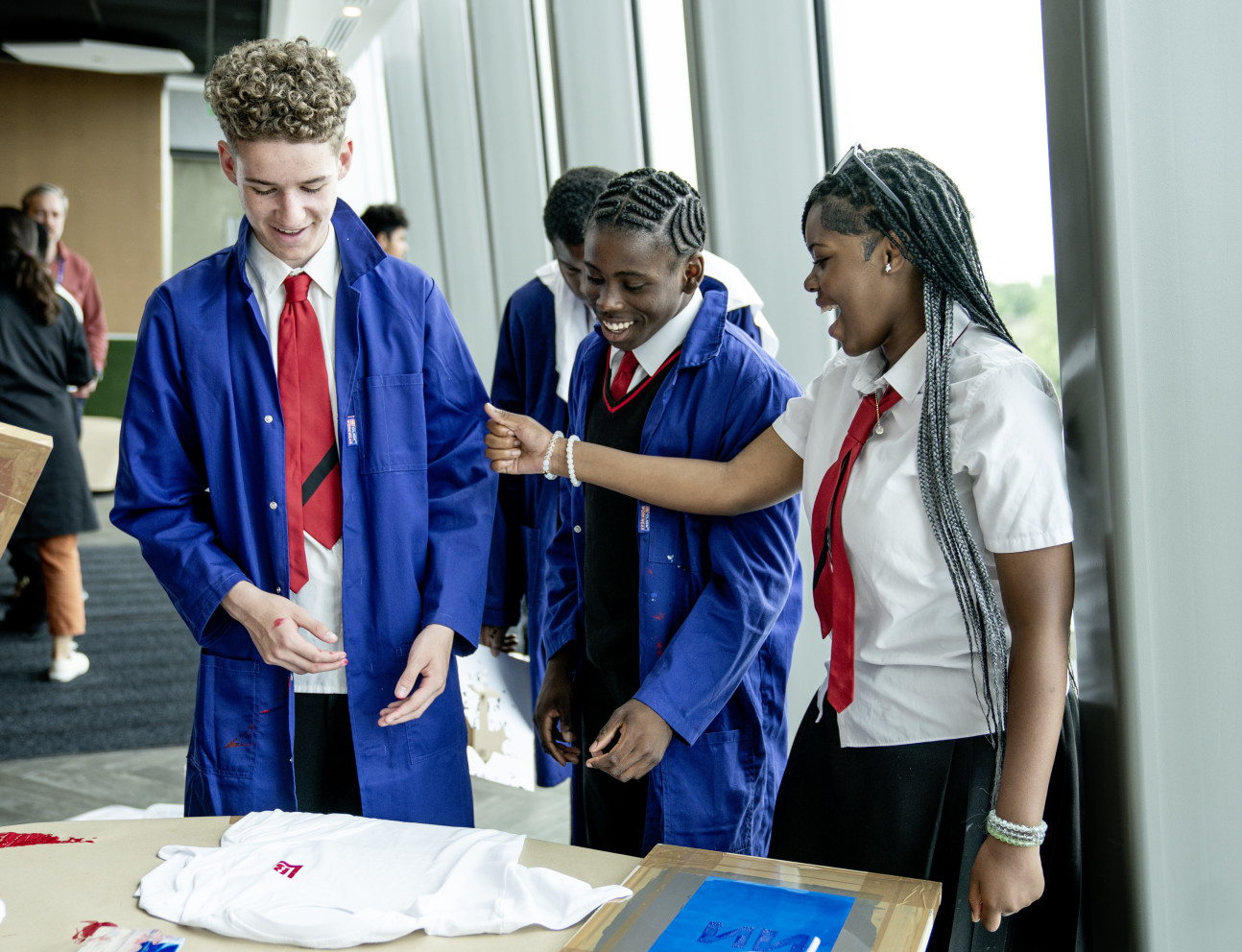 Outside community showcase finales, the team undertook two community events this year. The first was with Tottenham Hotspur Foundation as part of their Inspires Programme, where the team delivered a screen-printing workshop to 49 young people from underrepresented backgrounds, combining making and mathematics within the sports theme.
Outside community showcase finales, the team undertook two community events this year. The first was with Tottenham Hotspur Foundation as part of their Inspires Programme, where the team delivered a screen-printing workshop to 49 young people from underrepresented backgrounds, combining making and mathematics within the sports theme.
The team also developed a bespoke design and engineering activity for the local W12 Festival. The activity was a biomimetics project where young people built their own artificial hand using straws for fingers and strings as tendons. Approximately 50 attendees engaged with the Makerspace stall and took part in the activity.
Article text (excluding photos or graphics) © Imperial College London.
Photos and graphics subject to third party copyright used with permission or © Imperial College London.
Reporter
Rebecca Sweeney
Office of the Provost
Ellie Cawthera
Communications Division